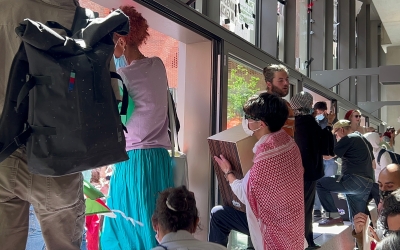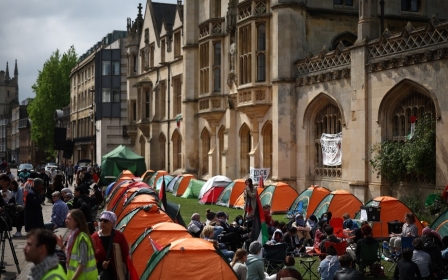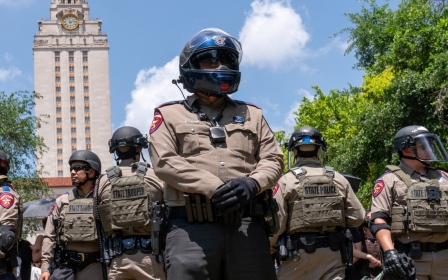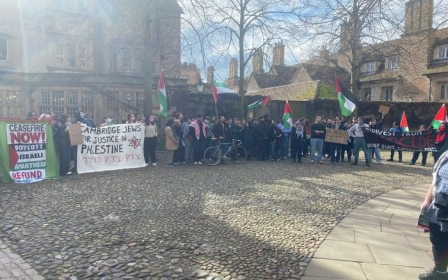King's College first London college to halt direct investments in Israel's arms suppliers
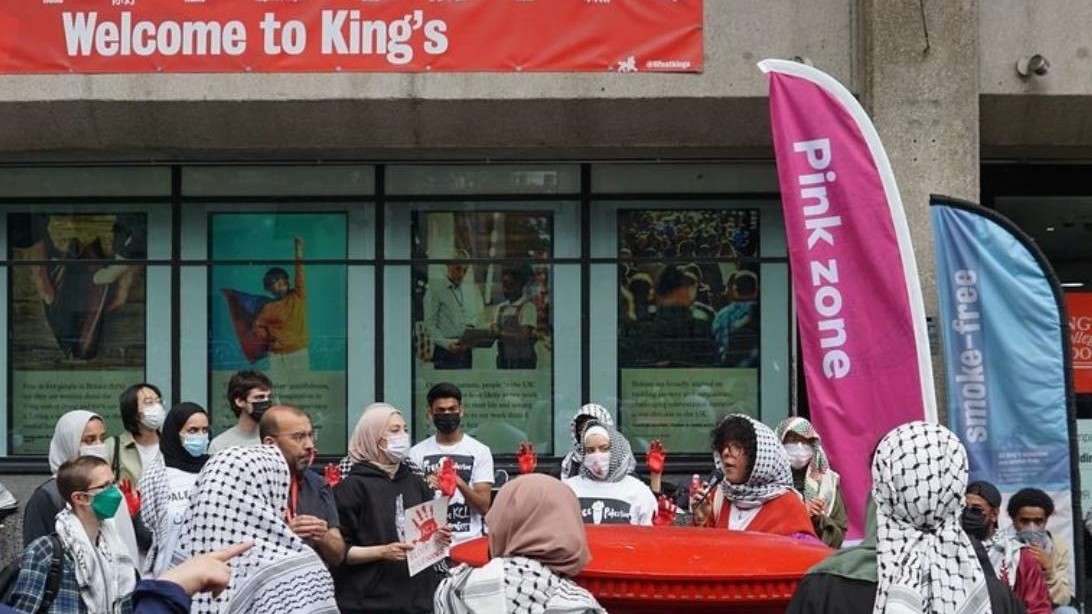
King’s College London (KCL) is set to revise its policy on investment in arms companies following student protests in solidarity with Gaza.
The vice president of welfare and community at King’s College London Students’ Union, Hassan Ali, made the announcement on Instagram on Wednesday.
“I am pleased to announce that after a series of extensive negotiations, we have reached an agreement with King’s College London to revive their investment policy in arms companies in light of the genocide taking place in Palestine,” he said.
Ali and his colleagues Sadaf Cheema and Alizeh Abrar were suspended in December for five months for their stance on Gaza and their activities in the students' Gaza solidarity campaign.
The divestment will see a stop in all of KCL's direct investments in companies such as Lockheed Martin, L3Harris Technologies and Boeing, known to be leading military suppliers for Israel's military and involved in the manufacturing of cluster bombs, land mines, depleted uranium weapons and other armaments.
New MEE newsletter: Jerusalem Dispatch
Sign up to get the latest insights and analysis on Israel-Palestine, alongside Turkey Unpacked and other MEE newsletters
“The university will no longer invest in companies engaged in the production or distribution of controversial weapons,” added Ali.
KCL's finance executives have approved of the policy change and have begun to implement it, Ali said, but the agreement will be formalised and officially announced in October, which is when the next investment committee will take place.
Under the ‘Controversial Weapons’ clause in KCL’s Environment, Social and Governance framework a paragraph will be added detailing that the university will “not hold any direct or indirect (via pooled funds) investments in companies deemed to be engaged in controversial weapons,” The Times reported.
Divesting from companies with investments in Israel’s arm manufacturing was one of three demands students made to the leaders at KCL, Ali explained.
The other two included a demand for KCL to help rebuild Gaza’s educational institutions, and to halt indirect investments into banks and financial institutions supporting Israel.
The latter includes a pledge to divest from BlackRock, a US-based investment giant which is heavily investing in both Lockheed Martin and Boeing, which the university refused.
“My analysis is that, in addition to halting direct investments, which we have achieved, KCL will agree on helping to rebuild Gaza’s educational institutions, but pushing the university to halt indirect investments will be difficult,”Ali said.
'A testament to the power of our community'
Hundreds of student protests and solidarity encampments in protest of Israel’s 10-month-long war on Gaza, which has so far killed more than 39,480 Palestinians, have erupted worldwide. More than 36 are in the UK alone.
The protest camps, some of which immobilised entire campuses for several days, were set up to push university administrators to end investments in Israeli companies and defence companies that sell arms equipment to Israel and to call for a permanent ceasefire.
Some of the protests, especially in the US, were subject to harsh repressions by state authorities and university administrators. The starkest example remains Columbia University’s Gaza solidarity camp, which has now become a nationwide story of police repression of student protests for Palestine.
On 30 April, university administrators ordered New York law enforcement to enter the camp and forcefully tear it down, subjecting protesters to police violence, arrests, suspensions and permanent expulsions. Students at Emory University in Georgia have reportedly been the first to face tear gas attacks by the police.
Over the course of the last months, several student protests have ramped up their negotiating efforts to force university administrators to the negotiating table. In several cases, the protest camps achieved tangible results, with KCL being a case in point.
“King’s College is the first uni in London to formally formulate a divestment,” Ali said. “This milestone is a testament to the power of our community’s dedication and perseverance”.
Other known cases of successful divestment are the University of York and Trinity College in Dublin.
Last week, Cambridge University announced it will review its approach to “responsible investment” in response to a months-long pro-Palestinian student encampment at the university, citing appeals by the student union which have prompted it to consider whether its investment policy is “in line with our institutional values”.
Last month, students at Wales' Swansea University managed to push the university to divest £5m from UK banking giant Barclays, which provides billions of pounds worth of investment and loans to arms companies selling weapons and military technology to Israel.
In light of KCL’s investments in Barclays, Hassan Ali asked KCL’s leaders to follow suit, but to no avail.
“The university would have to change too much of their financial system. And they don't want to appear too biased against Israel,” he said.
Pushing other London universities to cease direct investment abetting Israel’s war crimes will be difficult, Ali believes, however, not that KCL already had “a somewhat ethical investment policy.”
Universities like the London School of Economics (LSE) invest £8,733,746 in 21 companies that work with and/or supply the Israeli military and/or police, a report published last month has shown.
Other UK universities, Ali anticipates, will participate in a country-wide working group aiding in rebuilding Gaza’s schools and universities.
“Universities will hand out symbolic victories rather than tangible outcomes,” he said. “Helping to rebuild educational facilities is a humanitarian and a-political stance.”
Middle East Eye delivers independent and unrivalled coverage and analysis of the Middle East, North Africa and beyond. To learn more about republishing this content and the associated fees, please fill out this form. More about MEE can be found here.


